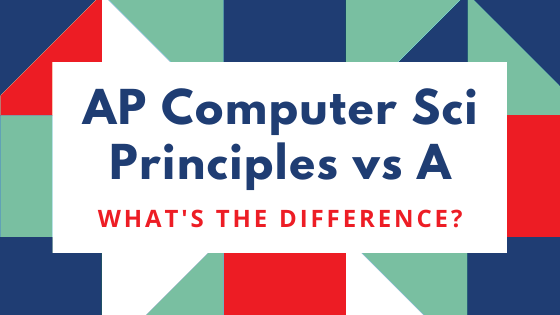What are AP CS Principles and AP CS A?
AP Computer Science Principles and AP Computer Science A are the two advanced placement computer science exams offered by the College Board.
- AP Computer Science Principles focuses on foundational concepts and ideas in computer science, separate from any specific programming language.
- AP Computer Science A focuses on object-oriented programming and problem solving with Java.
Key Differences:
One of the goals when AP Computer Science Principles was introduced in 2016 was to expose more high school students to computer science and how it affects the world around them. The CS Principles course does not have a fixed programming language; students are expected to understand programming concepts and algorithms using pseudocode and flowcharts. Teachers can use specific programming languages such as Python, Java, or C++ as examples, but they are not required for the written portion of the exam.
On the other hand, AP Computer Science A focuses more on programming. Object-oriented programming is stressed, and students learn using Java as a programming language. Students must be comfortable with Java syntax, libraries, and structures for the exam.
The differences in two courses is also evident in the format of the AP exam:
- AP CS Principles has both a written exam and a project that must be submitted. The written exam is multiple choice. Students answer questions about algorithms and basic programming, but also about how computers work and interact with the world. The student project can be done in any programming language, and must demonstrate the student’s capability to solve a real world problem using programming.
- The AP CS A exam features both multiple choice and free response questions. The multiple choice questions test student knowledge about the Java programming language as well as concepts in object-oriented programming and programming best practices. The free response questions require students to write Java code.
Which course and exam should you take?
Neither AP Computer Science course requires previous programming experience, but AP Computer Science Principles is probably more accessible to students without a computer science background.
AP Computer Science Principles serves as an introduction to computers and computer science to students. Students just starting out might use AP CS Principles to gauge their interest in computers and programming before taking a more advanced course. The more open ended nature of the course exposes students to a wide range of topics, including programming, but also data science, the internet and networking, etc. Time and schedule permitting, AP Computer Science Principles can be a great course to take before taking AP Computer Science A.
AP Computer Science A is a focused course on object-oriented programming with Java. Students are not required to know Java or have programming experience before taking the course, but some background with programming and computers is very helpful. Students who want to pursue computer science or software engineering in college should take AP Computer Science A. Object-oriented programming is very important to understand, even for programming languages outside of Java.
How to Prepare:
Students preparing for an AP exam should take an accompanying AP course to prepare for the exam.
- AP Courses at your school: Many schools offer AP courses during the school year and these are a great way to take AP courses prepare for the exam.
- AP Courses outside your school: Fitting AP courses into a high school schedule can be difficult! Many schools have restrictions on how many AP courses a student can take or have a lot of prerequisites before a student can take an AP course.
Areteem offers online AP courses, both in the summer and during the school year. Click here for more information about upcoming offerings!
In addition to a full course, many options for review are available before the exam each Spring:
- College Board: The College Board website features official descriptions for AP Computer Science Principles and Computer Science A, plus released exam questions from previous years (AP Comp Sci A Free Response Archive).
- Khan Academy: Khan Academy offers free review content for students preparing for the AP exam (AP Computer Science Principles Review).
- Areteem 8 Week Review Courses: With so many resources available, it’s hard to know how to best prepare. Areteem offers personalized final review with small class sizes to helps ensure your 5 on the AP exam.
